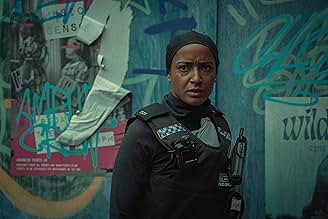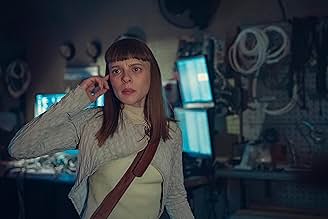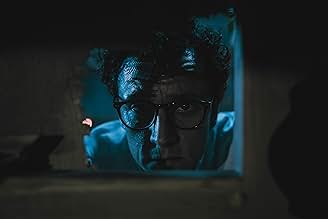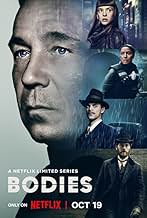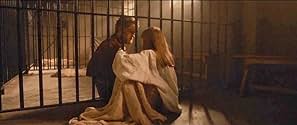Cuatro detectives en cuatro épocas distintas de Londres se encuentran investigando el mismo asesinato.Cuatro detectives en cuatro épocas distintas de Londres se encuentran investigando el mismo asesinato.Cuatro detectives en cuatro épocas distintas de Londres se encuentran investigando el mismo asesinato.
- Nominada a1 premio BAFTA
- 1 premio ganado y 6 nominaciones en total
Explorar episodios
Opiniones destacadas
It is a truth universally acknowledged that any plot involving time travel, especially any that attempts to deal with the so-called grandfather paradox, will necessarily be so full of holes that, if it were a fishing net, only the great whales would be endangered by it. In that regard, Bodies certainly does not disappoint, piling impossibility upon impossibility at a head spinning pace. However it is the panache and insouciance with which such concerns are dealt that determines whether a show will emerge battered to death or greatly loved. With great performances from the lead characters, particularly Jacob Fortune Lloyd as the thoroughly corrupt wartime cop whose heart is melted by a child (a charming live-action debut for Chloe Raphael), and a brilliant script that revealed only as much as necessary at each stage and kept you guessing until the very end, Bodies easily triumphs over its unavoidable absurdity.
I am enjoying the series, if I close my eyes during the gorey scenes where history is being mutilated....
It's impossible to be 100% accurate, but sometimes the mistakes are distracting. Like many contemporary productions, this series fails to understand how people behaved in the past. There are two instances in particular that particularly stand out.
In 1890 London, the molly house with two men dressed up in corsets on the street simply wouldn't have happened in daylight in front of the police because they would have been immediately arrested. It wasn't okay to act gay in any way in public in 1890.
The other most egregious errors occur in the 1941 blitz scenes, with people screaming and running for shelter from their apartments while bombs are falling in the neighbourhood, and the crowds then being denied access to an underground station for shelter. Anyone who has ever talked to anyone who lived in London during the Blitz knows that Londoners were prepared and calmly resigned to the bombings. There were usually many minutes between the first alerts and the first bombs - enough time to make a thermos of tea and dress warmly. There were also alternate street-level shelters to the undergrounds, and many people just defied fate and waited it out at home. As well, the cars have too much light being projected from the head lamps, and the detective's apartment had no blackout curtains, so sitting in the apartment with the lights on was illegal, and he would have been fined or arrested. Covering light from windows would have been tested in drills by ARP officers from the home army in the early months of the war, well before the Blitz began.
It's too bad these blatant errors exist because they pull down the quality of the production. Period set films really need historians to check basic facts, and directors need to LISTEN to them.
It's impossible to be 100% accurate, but sometimes the mistakes are distracting. Like many contemporary productions, this series fails to understand how people behaved in the past. There are two instances in particular that particularly stand out.
In 1890 London, the molly house with two men dressed up in corsets on the street simply wouldn't have happened in daylight in front of the police because they would have been immediately arrested. It wasn't okay to act gay in any way in public in 1890.
The other most egregious errors occur in the 1941 blitz scenes, with people screaming and running for shelter from their apartments while bombs are falling in the neighbourhood, and the crowds then being denied access to an underground station for shelter. Anyone who has ever talked to anyone who lived in London during the Blitz knows that Londoners were prepared and calmly resigned to the bombings. There were usually many minutes between the first alerts and the first bombs - enough time to make a thermos of tea and dress warmly. There were also alternate street-level shelters to the undergrounds, and many people just defied fate and waited it out at home. As well, the cars have too much light being projected from the head lamps, and the detective's apartment had no blackout curtains, so sitting in the apartment with the lights on was illegal, and he would have been fined or arrested. Covering light from windows would have been tested in drills by ARP officers from the home army in the early months of the war, well before the Blitz began.
It's too bad these blatant errors exist because they pull down the quality of the production. Period set films really need historians to check basic facts, and directors need to LISTEN to them.
I wasn't sure what to expect when I first started Bodies. The reviews were mostly good but the only actor I recognized was Stephen Graham so I thought how good could it be? Well, it was pretty damn good as was the entire cast. It's a time travel series that reminded me of Dark but easier to follow along. It's about four different detectives, in four different time periods, all investigating the exact same murder. It may start a little slow for some but stay with it because I promise it picks up. The best thing about it is it doesn't end with some cliffhanger, it has a very satisfying ending. If you enjoy sci-fi and time travel then give this a try. You won't be disappointed.
As a weaving of four stories this works well. The sets are great and even the thirty years into the future thread wasn't too out there.
There are a few good characters, some good light and shade and some that develop nicely as the series progresses.
Everything starts with a body being discovered in a lane in London and develops with four different time lines, Victorian, World War Two, present day and thirty years into the future. At first there is a lovely kind of what-is-going-on feel to the story, but come the middle of it, you realise that it's just the same thing that's been done so many times in so many other sci-fi programmes and films that it becomes more and more disappointing and eventually so incredibly and sadly predictable.
There are a few good characters, some good light and shade and some that develop nicely as the series progresses.
Everything starts with a body being discovered in a lane in London and develops with four different time lines, Victorian, World War Two, present day and thirty years into the future. At first there is a lovely kind of what-is-going-on feel to the story, but come the middle of it, you realise that it's just the same thing that's been done so many times in so many other sci-fi programmes and films that it becomes more and more disappointing and eventually so incredibly and sadly predictable.
Hokum but I enjoyed it all except the WWII London police car sirens which weren't fitted until 1963 when they also introduced the blue flashing beacons. They just had bells but like all science fiction fans I do tend to be obsessively pedantic. I was prepared to accept all the other minor errors but those police car bells are a sound of those times which transport me back in time which the film makers missed. I suspect that those not liking science fiction will find the plot difficult to follow and the continual time shifts confusing but the production isn't made for non science fiction fans so if this isn't your style, don't bother struggling with the plot. :-)
¿Sabías que…?
- TriviaBased on the 2015 eight issue mini series of graphic novels from Vertigo / DC (Detective Comics).
- ErroresAt the end of Episode 8 as DS Whiteman is walking along a street in 1941 Whitechapel there are posters for an upcoming piano recital by Polly Hillinghead (the daughter of DI Hillinghead). The poster says the recital is to happen at Wilton's Music Hall in nearby Shadwell. The Music Hall closed in the 1870s and in 1941 the building was used as a mission hall by the Methodists. It became a music hall again in the 1990s.
- ConexionesFeatured in Half in the Bag: 2023 Catch-up (Part 2) (2023)
Selecciones populares
Inicia sesión para calificar y agrega a la lista de videos para obtener recomendaciones personalizadas
- How many seasons does Bodies have?Con tecnología de Alexa
Detalles
- Fecha de lanzamiento
- País de origen
- Sitio oficial
- Idioma
- También se conoce como
- Bodies
- Locaciones de filmación
- Productoras
- Ver más créditos de la compañía en IMDbPro
- Tiempo de ejecución1 hora
- Color
- Mezcla de sonido
- Relación de aspecto
- 16:9 HD
Contribuir a esta página
Sugiere una edición o agrega el contenido que falta

Principales brechas de datos
What was the official certification given to Cadáveres (2023) in Canada?
Responda




